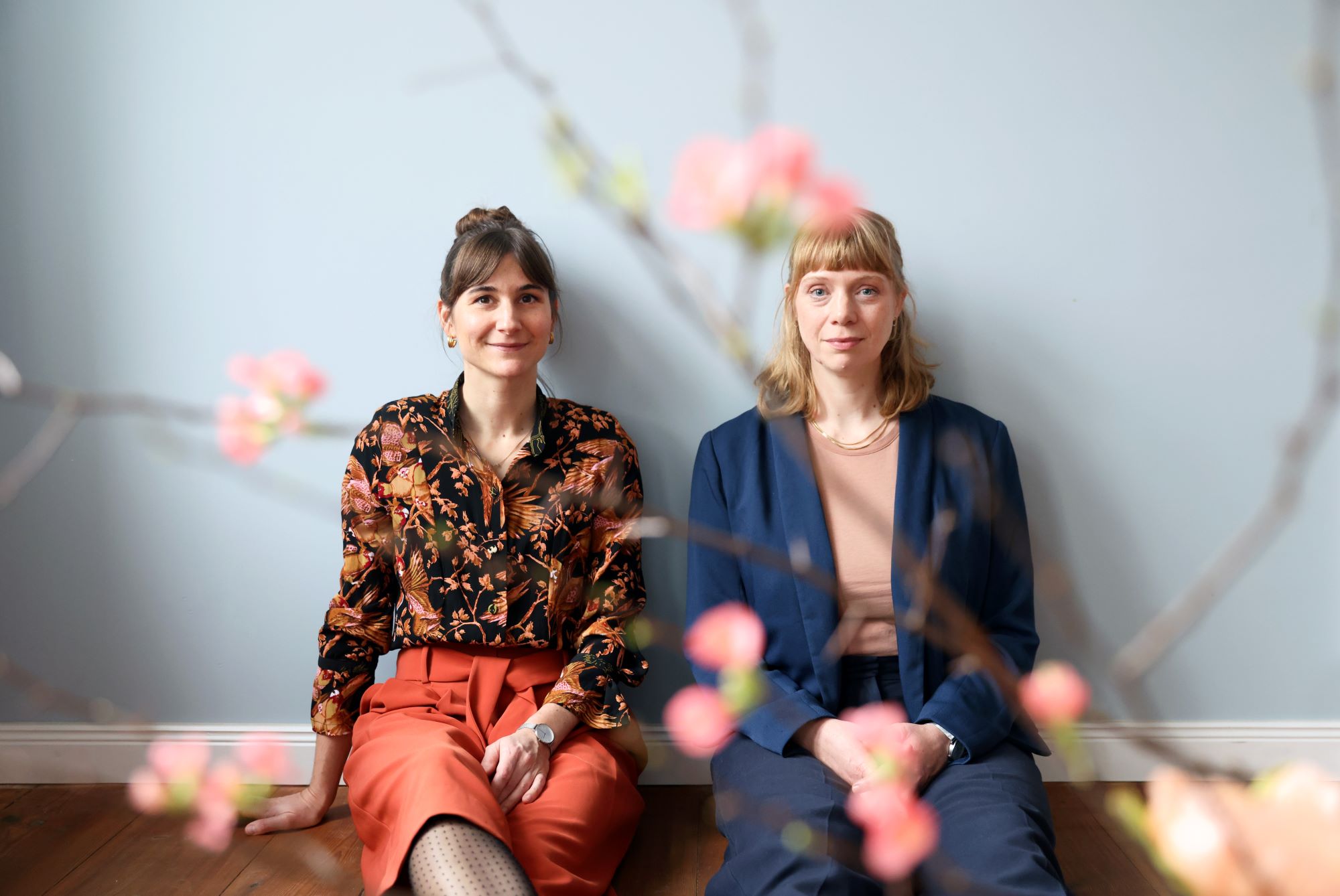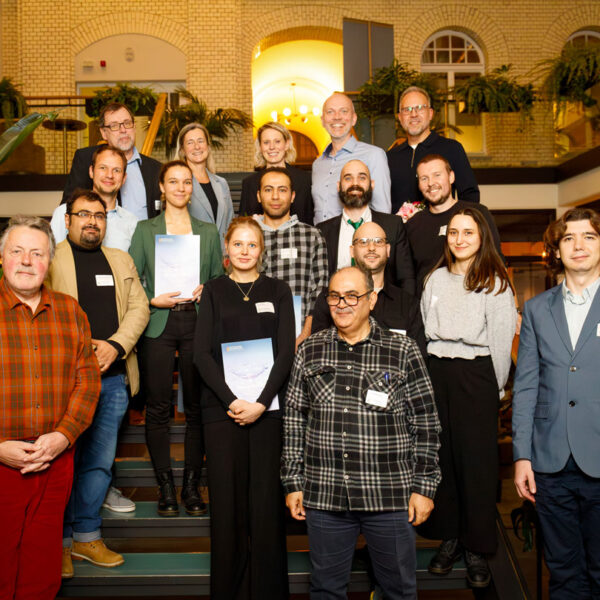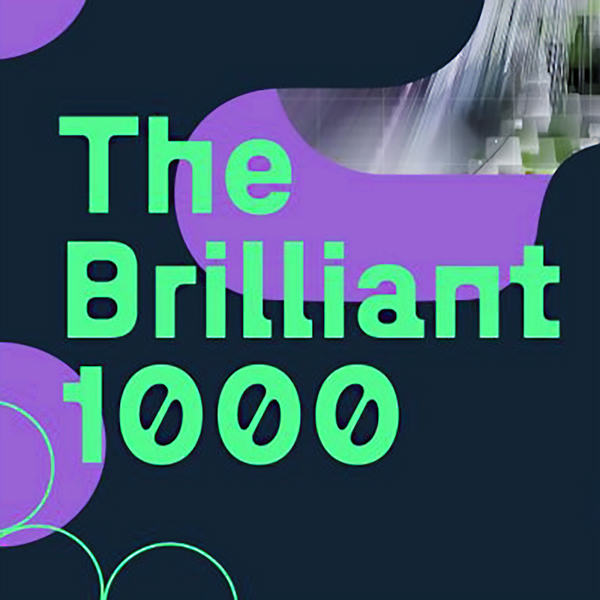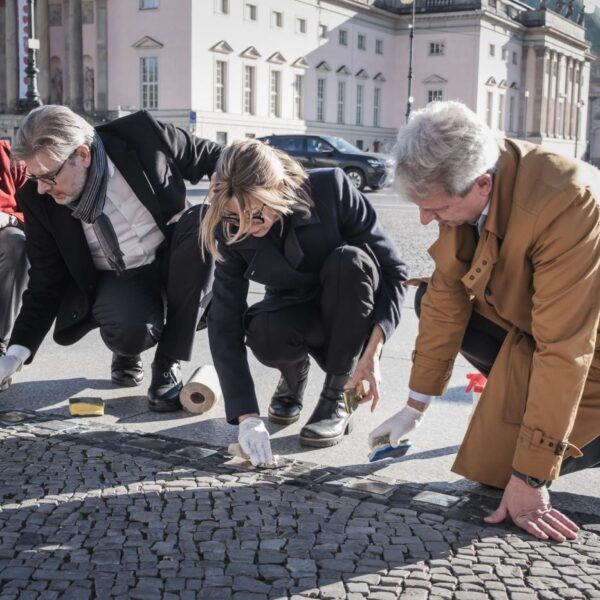In 2024, they moved into the incubator at Humboldt University’s Mitte campus to further develop their startup: Eva Hartmann and Miriam Becker founded the company Kreis & Raum with the aim of making grief support and funerals more holistic and personal. Interestingly, neither of the two founders originally came from the funeral industry. So what led them to focus their work on a topic that most people prefer to avoid? How does their company differ from other funeral services, which moments have touched them most deeply, and what role does nature play in dealing with death? Miriam and Eva shared their answers to these and many more questions with us in detail.

What are your professional backgrounds and how did the idea arise to become funeral director and grief counselor?
Our professional backgrounds are quite different. In our “first lives,” Eva was an architect, while Miriam worked as a project manager and freelance copywriter. So we are both career changers in the funeral industry and have trained ourselves through various internships and courses with hospice services and other funeral companies.
The image of a funeral director is often primarily that of a salesperson rather than someone who accompanies and supports people in their grieving process. Unfortunately, we experienced this ourselves, which led us to start exploring grief and new rituals.
When you talk to people about their experiences with funerals, many describe them as disappointing. For some, the ceremony felt too impersonal or the decorations too kitschy. Others recall being shocked at the high costs, while also feeling they had no time to carefully consider important decisions.
We want to show that a funeral doesn’t have to be something you just “get over with,” but rather something that can actually support and help in the grieving process.
In general, we want to bring a breath of fresh air to the topics of dying, death, and grief, and help take them out of the taboo zone. The core problem is that people are often uncomfortable around those who are grieving, which means there is little exchange of experiences. As a result, most people don’t know about the possibilities that exist. And on top of that, the time after the loss of a loved one often becomes a very lonely period.
How did you come up with the idea to found “Kreis & Raum”? What is your business model?
From our own experience, we know how easy it is to feel completely lost in the funeral jungle when you lose someone for the first time and have no idea what is actually possible. Many people assume there is just one prescribed path and that the funeral home will know what’s best. It’s often only months after the funeral that people realize what they would have wanted to do differently and how much it all really cost. That’s why we want to open up the “black box” of funerals and shed some light on it.
We are mission-driven and want to make a change, but at the same time we have a clear business model to achieve this. Our revenue comes from providing the more traditional funeral services. Beyond that, we offer free pre-planning consultations, where people can plan and document their own funeral wishes. In this way, and through educational work on Instagram and other platforms, we want to encourage people to think about the subject early on.
After the funeral, we want to continue supporting those in mourning and connect them with others. We are planning an online platform where we will offer group activities. Ideas range from grief yoga and neighborhood walks to forest bathing and pottery. Right now, we are exploring what people are most interested in and we always welcome feedback on this idea or on what has helped you personally in times of grief (bestattung@kreisundraum.de). If any providers of such activities feel addressed, we would be delighted to hear from you as well.
What is so special about “Kreis & Raum”? How do you differ from other funeral services?
Our approach is to provide funerals that are accompanied by grief support, rather than seeing a funeral only as a purely organizational service. For us, the planning and the day of the burial are a central part of the grieving process.
That’s why we actively involve the bereaved as much as they wish. For example, we offer the possibility to see the deceased again, to wash and dress them together, to paint or decorate the coffin or urn, to speak during the ceremony, to write a letter to be placed in the grave, to play music, to read a poem, and much more. This grief-supportive approach also led us to the idea of bringing people together in communities after the funeral, so that they are not left alone in their grief.
We also see ourselves as a place for unconventional ideas. Especially in a big city like Berlin, many people no longer feel connected to any religion. We help to develop new rituals that allow for a personal farewell. In the end, it’s usually not much that we add ourselves. We simply go into every conversation with an open mind and create a space where people feel encouraged to share their own ideas. Even confetti and peppermint schnapps at the grave are possible. Thankfully, there is now biodegradable glitter or flower-seed confetti.
It can also be important to involve children. Many people fear doing something wrong here. There are rarely universal answers, but for most children it is actually very important to be present. The notion of older generations—that children are overwhelmed by death—rarely reflects children’s actual experience. Children deal with these topics differently than adults and grieve in their own way. As adults, we often feel the urge to protect them, but in our experience, this is not necessary in this context.
Another area where we differ from conventional funeral homes is in transparent pricing. Online, people can compare prices for almost everything, but interestingly, the funeral industry remains very closed. Only flat rates are usually published, while detailed costs for individual items are not shared. Price information for urns, for example, is available only to funeral directors, not to private individuals. We take a different approach with our pricing. We offer a package price for support and organization (currently €2,950 for a cremation) and pass on the many additional items (such as coffin, urn, flowers, transportation) directly to the client, with only a small handling fee of 15%.
We have also noticed that many people wish for funerals connected to nature. A frequent question is what kinds of natural burial options and places are possible. We provide a lot of advice on this and now know well where tree burials are possible in Berlin cemeteries. A connection with nature often goes hand in hand with the desire for an ecological funeral. Our network of partner companies and suppliers is local to Berlin and its surroundings, all materials are biodegradable, and for every cremation we conduct, we ensure CO₂ compensation. That is the scope of what is currently possible. Beyond this, we are waiting for approval of a new type of burial that is not yet permitted in Berlin. This process, called recomposition (or “Reerdigung” in German), transforms the body into soil within about five weeks—essentially composting. We are among the first companies in Berlin preparing to offer this method as soon as funeral law allows it.

What do you personally gain from your work as funeral directors and grief counselors?
We are constantly reminded of how overwhelming and burdensome the subject of dying can be for many people. When someone walks through our door with their head down and then leaves after our conversation, for example, after making arrangements for an ill mother with visibly lighter shoulders, it is an incredibly fulfilling feeling.
We also have the privilege of engaging in profoundly deep conversations with complete strangers almost instantly. Along the way, we meet fascinating personalities and are entrusted with the stories of their deceased loved ones. Especially during the preparatory conversations for a funeral speech, which can sometimes last two to three hours, we learn about the most moving life journeys as well as many vivid, joyful moments. Having the honor to share these stories once more at the funeral service is deeply meaningful.
This profession is, in every sense, as diverse as people themselves.
Is there an encounter has particularly moved you or stayed with you?
Many experiences have touched us. Simple moments, like sharing peppermint schnapps at the grave or painting a coffin together with children, have left a mark on us. But one situation in particular stands out in our memory: during a funeral, a grandson found truly beautiful and vividly expressive words for his late grandmother and delivered them in front of a large congregation in the chapel. It completely overwhelmed us emotionally, and neither of us could hide our tears.
However, as long as we’re not the loudest sobbing in the back row, we consider it completely okay and simply human. Even as funeral directors, we are not exempt from these emotions.
Do you sometimes find it difficult to distance yourselves from the grief you deal with at work? How do you maintain a separation between your professional and private life?
We always approach our work with what we call “professional closeness.” This means we are empathetic and emotionally engaged in supporting the bereaved, while remaining fully aware of our role as funeral directors. We are not meant to be personal friends.
The most important factor, however, is that we work as a team and can support each other. From the very beginning, it was clear to both of us that we did not want to take this career path alone we needed a sparring partner. So far, this has worked wonderfully.
In addition, we maintain good contact with other funeral companies that share a similar mindset, which allows us to see an extended network of supporters.
What advice do you have for people who have recently lost a loved one?
Phew, that’s a big question. There isn’t really a simple answer. In general, many people find it helpful to listen to their own feelings and do what feels right for them, rather than focusing too much on what others expect. Easier said than done, of course.
One thing we think is important to say: right after a death, people often have more time than they realize. And there are usually more opportunities than expected to feel close to the deceased one last time or to help shape the funeral.
In the acute period of grief, or even later, the pain can feel truly unbearable for some. Some even feel like they might lose their mind or are overwhelmed by guilt. This is completely normal. Grief, even intense grief, is a natural emotional response to loss. It is perfectly okay, healthy, and important to seek help.
This support can come from one’s own social network, but also from professional grief counselors or support groups. We are happy to assist in finding the right resources.
In what ways can nature be healing after a loss?
The calming effect of the color green and a walk in the forest is one aspect. What can also be healing is reflecting on the natural cycle of life, which also inspired the name of our company, Kreis & Raum. When a person dies, we lose so much. At the same time, the idea or the image of the body returning to the elements of earth, air, or water can be comforting. For many, a forest or sea burial is therefore a meaningful way to come to terms with the death of a loved one.
What can society do to destigmatize the subject of death?
In fact, we believe that the immediate environment of a grieving person can make a huge difference. When you learn that a friend or neighbor has experienced a death, it’s usually a good idea to reach out and stay present. By “stay present,” we don’t just mean saying, “Call me if you need anything,” but offering concrete forms of support like helping with shopping, listening, or going for walks. Grieving people often isolate themselves because they notice that those around them feel uncomfortable with the situation. If someone in grief doesn’t want to talk about the deceased, they will tell you. But asking and checking in is a good way to break the taboo.
Another lever for change is the media. Through portrayals in films, television, magazines, and books, we often develop completely false ideas about dying and death and also about grieving.
Thank you for the interview!












